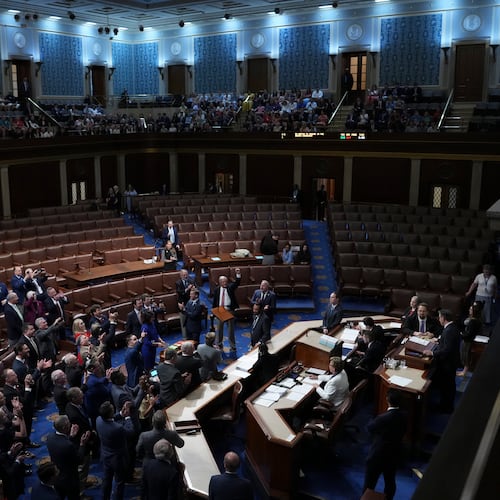In his latest book, “Anti-Pluralism: The Populist Threat to Liberal Democracy,” William Galston of the Brookings Institution wrote: “When I began writing about the travails of liberal democracy a few years ago, I believed economics represented the heart of the matter.” Everyone bought into the democratic system so long as prosperity was increasingly and widely shared. However, Galston had seen enough to know there may be bigger, less rational - and hence, harder-to solve - problems. “Alongside economic difficulties, other problems weakened the foundation of popular support for established institutions.”
In his view, it was mass migration - in Europe before Brexit and in the United States before President Donald Trump - that represented a threat in the minds of many non-college educated Americans, a threat that went beyond economics. Fears of being socially and culturally displaced, Galston posited, account for much of the right-wing populist backlash against center-left democracies.
Sitting in his Brookings office, Galston told me that in Britain, “places that experienced rapid change, places that had never seen any immigrants” were some of the strongholds for the Leave vote. He recalled staying up the night of the Brexit vote in June 2016 and watching a BBC interview. Asked whether he understood the potential damage to Britain by leaving the European Union, Galston also recalled, a Leave supporter agreed that it was possible. “But at least we will be in control of our country,” he said.
President Trump has expertly exploited the sense that aging, white baby boomers held that the country they knew was slipping away. The vague nostalgia for a country more homogeneous - more like them - was a critical factor in Trump’s support among older, white working-class voters.
Galston told me that between 1924, when the “door slammed shut” on immigration, and 1965, when a period of restrictive immigration ended, “the number of first-generation Americans dropped by two-thirds, to 4.7 percent.” It was during this period, he said, that ethnic differences among European groups (Italians, Irish, Jews, etc.) in the United States largely dissipated. It was also a time of strong civic institutions and social solidarity (in part because of World War II, and then the Cold War). American institutions were undergoing waves of change (civil rights, women moving into the workplace, deeper cynicism about government), and were weakening just as the centrifugal forces of growing diversity pulled us apart. “Institutions matter,” Galston told me. Civic unity - the nonpartisan and nonsectarian religion of public life that elevates our creedal beliefs in democracy - weakened when we perhaps need them the most. Our democratic creed, Galston stressed, “is the container of our diversity.”
So do we give up on the multiethnic, multiracial democratic experiment? Do we cater to the biases and ignorance of people wrongly convinced foreigners are taking their jobs? Galston said he remains optimistic about the democratic experiment: “My optimism is based on the assumption that what we did in the past is still possible.” Put differently, we have the ability to come together to meet profound challenges without letting differences overwhelm us. That includes, he said, a revitalization of civic education.
In his book, Galston recommended some practical approaches to reunifying the country and sapping the resentments that fuel anti-democratic populism - accelerating growth, ending the preferential treatment for capital gains and connecting rural regions to high-growth metropolitan centers. He cautions against elites’ arrogance. However, in our view, he should be at least as stern with those who think race and religion determine who is an American. We risk infantilizing red America by suggesting they are victims; we risk ennobling bigots by countenancing xenophobia.
Galston also urged that immigration move in the direction of skills-based criteria would help ease native-born Americans’ anxiety. “So would an increased focus on acquisition of English fluency and a working knowledge of American history and institutions,” he wrote. However, the threat of naked bigotry and the entire conservative media machine that perpetuates it is all too real. Frankly, for Trump’s base, nothing other than mass expulsion of illegal immigrants and a radical reduction in black and brown immigrants will do.
Finally, Galston stressed that leadership matters a great deal. He wrote:
“Good democratic leaders combine capability and legitimacy: they have the attributes needed to exercise power wisely while respecting the ongoing need for public authorization… . In addition to skills, democratic leadership requires a strong set of virtues to safeguard it from going astray. One such virtue is what I call democratic humility: the belief that the legitimacy of your power ultimately depends on the will of the people, not just on your own merit.”
In other words, we would do well to find a successor for Trump who is the anti-Trump - aware of the limits on his own power, fully cognizant of the reality that “he alone” cannot fix our problems, and determined to reject the hyper-tribalism that feeds populism.
Galston’s book is a useful reminder that Trump’s brand of populism is part of a worldwide phenomenon, as well as particular to the economic, cultural and demographic circumstances in which we find ourselves. Economics alone cannot defuse populism, but a renaissance of civic engagement and a robust effort to connect rural, declining regions with prosperous metropolitan areas may help bridge our differences and lower resentments. The good news is that the anti-Trump backlash is stimulating an unprecedented number of women candidates, a vibrant youth movement and mass (but entirely peaceful) demonstrations. Moreover, the most diverse generation - millennials — is also the largest. We are not going back to an America in which whites perching atop the economic and social pyramid is a given. (Trump’s aging base is, in one sense, the last gasp of an increasingly marginalized, angry electorate.)
Perhaps the country is ready for a calm, competent and unifying leader after all. Certainly, the country would welcome a “return to normalcy,” if you will.
About the Author
Keep Reading
The Latest
Featured


